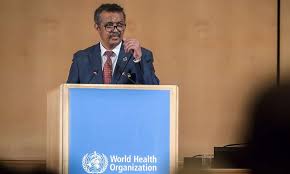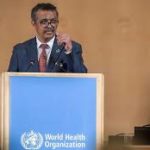By Asma’u Ahmad
The World Health Assembly (WHA) on Monday unveiled an ambitious plan on Monday aiming to benefit an overall population of three billion globally for the next five years with better health care and well-being. Newsmen report that the WHA is the forum through which the WHO is governed by its 194 member states.
It is the world’s highest health policy setting body and is composed of health ministers from member states. The plan, entitled 13th General Program of Work, was reviewed and passed during the first day of the Seventh WHA, which kicked off in Geneva on Monday, to guide the work of the WHO from 2019 to 2023.
The plan sets three strategic priorities to ensure healthy lives and promoting well-being for all at all ages, namely, to help one billion more people benefit from universal health coverage; one billion more people to be better protected from health emergencies; and one billion more people enjoying better health and well-being.
In his opening speech at the WHA, WHO Director-General Dr. Tedros Adhanom Ghebreyesus defined three keys behind the triple-billion targets. First is a strong WHO and leadership team that’s more efficient and effective in its business practices; then the political commitment from governments, as “with buy-in from the highest levels, anything is possible;” and third is an “even deeper and stronger” partnership “in whatever way we can to achieve our goal.”
Though the latest WHO annual report on the state of the world’s health, which was released on Thursday, highlighted remarkable progress in pushing forward the UN Sustainable Development Goals in some areas, it also warned that the progress has stalled and the gains already made could be easily lost.
The report underlined that still less than half the people in the world today get all of the health services they need.
The WHO also said that almost 100 million people were pushed into extreme poverty in 2010 due to health service bills; that 13 million people die every year before the age of 70 from cardiovascular disease, chronic respiratory disease, diabetes and cancer, mostly in low and middle-income countries; and that every day in 2016, 15,000
children died before reaching their fifth birthday.
“This is unacceptable,” Dr. Tedros said, which is why “We are transforming how we work to achieve our vision of a world in winch health is a right for all. We are changing the way we do business.” To fulfill the triple-billion plan, the WHO has vowed to step up leadership at all levels, drive impact in every country, and focus global public goods on impact.
In addition to offering technical support, the UN health agency is advocating health “at the highest political level” at all levels of governments, and strengthening its public voice for the plan and against any harmful practices from including industry.
Meanwhile, the WHO pledges to place countries squarely at the center of its work, and take into account country context and capacity to ensure that support is relevant and effective. It will also focus on setting norms and standards, as well as promoting and monitoring their implementation, and shaping the research agenda and disseminatingvaluable knowledge.
As the WHO’s highest decision-making body, the 71st WHA is convening from May 21 to 26 to gather nearly 4,000 delegates from its 194 members and partner organizations to set out the organization’s policy.





